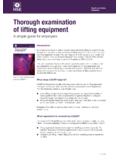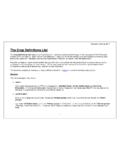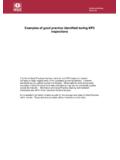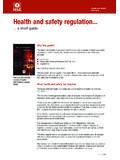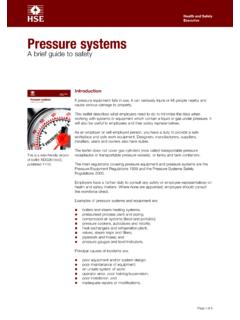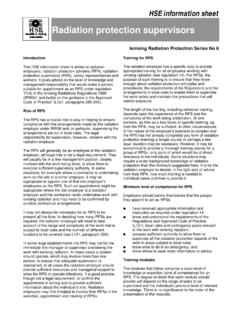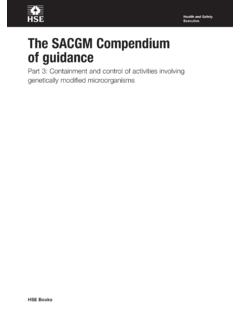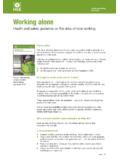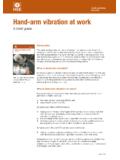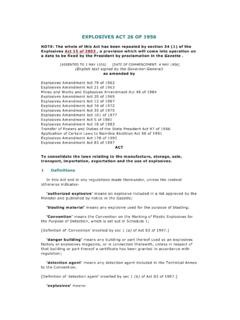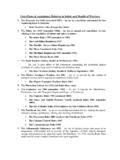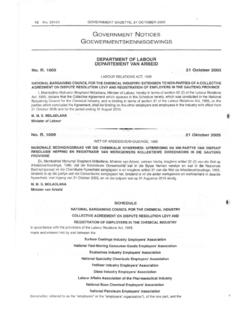Transcription of GUIDANCE ON REFUSAL/REVOCATION OF MSER …
1 GUIDANCE ON REFUSAL/REVOCATION OF MSER REGISTRATIONS/LICENCES AND THE APPEAL PROCESS Proposal to refuse or revoke a licence or Notifying the applicant, licensee or registered Confirmation of the decision to refuse or Appeal to the Secretary of Notification of 5 Statements to be served before the Appearances at the Representatives of Government Departments at the Procedure at the Site Procedure after the hearing where the appointed person is to determine the Notification of the Service of 7 Withdrawal of 1 Introduction 1. The Manufacture and Storage of explosives Regulations (MSER) give licensing authorities the power to refuse, revoke or vary licences, to refuse draft licences and to refuse or revoke registrations. The Regulations also give applicants, licensees and registered persons the right to make representations about the licensing authority s proposed action and (if the licensing authority subsequently decides to proceed) the right to appeal to the Secretary of State for Work and Pensions.
2 2. This GUIDANCE has two parts. The first part gives GUIDANCE to licensing authorities on the processes involved in refusal, revocation or variation. Its aim is to help licensing authorities ensure that their handling of the process follows the requirements laid down in the Regulations. 3. This section is also intended to ensure that applicants, licensees or registered persons receive a clear and transparent explanation of the licensing authority s proposed actions; that they are fully informed about their rights to make representations and are able to appeal against any decision in their case should they choose to do so. It is also intended to help reduce the risk (to both the licensing authority and the applicant) of going through the trouble and expense of having an appeal hearing only for the matter to be dismissed on procedural grounds.
3 4. The second part of the GUIDANCE gives information on the procedures and processes for an appeal to the Secretary of State under section 44 of the Health and Safety at Work Act. This is intended to assist licensing authorities and applicants, licensees and registered persons in the event that they are parties to such an appeal. Proposal to refuse or revoke a licence or registration 5. Regulation 15 requires the licensing authority to refuse a licence (including, where regulation 14(1) applies, a draft HSE licence) or a registration where it is of the opinion that: the proposed site, or a place within it, is not suitable for the manufacture or storage of explosives ; or the applicant is not a fit person to manufacture or store explosives . 6. Regulation 17 states that the licensing authority may revoke a licence or registration it has granted where: he site, or a place within it, is no longer suitable for the manufacture or storage of explosives ; or registration, that the applicant 7.
4 R new information about either the site and its surroundings, or about the e8. there has been a change in circumstances which means that tit appears on information obtained by it after granting a licence is no longer a fit person to manufacture or store explosives ; or revocation has been agreed with the licensee or registered person. A refusal to renew is treated to be a refusal to grant a registration or licence. It should be noted that the requirements of due process and natural justice/human rights law means that if a licensing authority were to decide to refuse a licence or registration in respect of a place it had previously licensed or registered, it must be able to justify why it has changed its view as to the suitability of the place. That justification mightbe a change of circumstances oxplosives to be stored there. In cases where the licensing authority is considering whether or not a person is unfit to manufacture or store explosives , the Approved Code of Practice and GUIDANCE (ACOP) to MSER makes clear that a conviction alone does not give automatic grounds for refusal or revocation (see ACOP paragraphs 550 to 2 552).
5 This means the licensing authority must therefore go a step further and consider whether there aregrounds for taking the view that the person cannot be relied upon to manufacture or store explosives safely. In considering this, the licensing authority may take into account the nature of the offence itself, any previous dealings with the person (including for example, enforcement notices, warnings/advice), awell as other eviden s ce and information about the person s behaviour before or after the offence. It will then be necessary to record those grounds so that it is possible to demonstrate that there has been a r9. person is not a fit person. Spent convictions may be taken into account in considering whether someone is a fit 10elation to r stration applications and to applications for COER explosives certificates. At the time of writing (September 2006) the Scottish Executive have no date for 11 revoke etc need to be conveyed to the person as transparently as possible so that they can, for example, challenge any factual issues, and they can see 12ify ust be made clear that the applicant or licensee has the opportunity to make representations to the licensing 13ite in the first instance to.
6 However, it should be noted that as the Regulations also allow the applicant to make 14ations from them, the licensing authority decides to proceed to refuse or revoke the licence or registration, or to vary the 15 gulations 2004. The legislation is different and the appeals processes are entirely separate. In view of this, it is suggested that the two issues are best y. 16 for thority he Secretary of State; although both sides would then have the opportunity to comment on the others submissions, it is preferable that new evidence is not introduced at the appeal stage. easoned process. Licensing authorities in England and Wales should note that the Rehabilitation of Offenders Act applies to decisions about licences and registrations under the Manufacture and Storage of explosives Regulations. Spent convictions may not therefore be used as ground for taking the view that aperson to hold an explosives certificate under the Control of explosives Regulations (COER).
7 The position in Scotland is different. Currently spent convictions do not need to be declared in rthe MSER licence and registration regime or in relation to applications for explosives certificates undeCOER. However, the Scottish Executive is proposing to amend the Rehabilitation of Offenders (Exclusions and Exemptions (Amendment) (Scotland) Order 2003 to require spent convictions to be declared in relation to both MSER licence/regithe coming into force of the amending order.. The grounds for the licensing authority s proposal tothe chain of reasoning that has led to this position. Notifying the applicant, licensee or registered person . Where a licensing authority proposes to refuse or revoke a registration or a licence (including a draft HSE licence) or to vary a licence without the agreement of the licensee, regulation 18 requires it to notthe applicant, licensee or registered person of the proposed course of action.)
8 In doing this it mauthority about its proposed course of action within 28 days from the date of the notification.. The notification should outline the process for making representations; for example, wrrepresentations orally, the notification should also include GUIDANCE on how to do that.. The notification should also inform the applicant that if, after considering any representlicence, they have the right of appeal to the Secretary of State for Work and Pensions.. It is very important that, where appropriate, the notification of the proposal to refuse or revoke a licence or registration for storage under MSER is clearly separate from a notice of intention to refuse or revoke alicence to supply fireworks issued under the Fireworks Redealt with in separate letters from the licensing authoritConfirmation of the decision to refuse or revoke.
9 If the licensee/registered person has not made representations by the end of the notice period, or any representations made have been considered, then the authority will go on to make its decision. It should inform the person of the decision to refuse or revoke or vary without agreement, with written reasonsits decision (regulation 18(3)). The statement should refer to all the information that the licensing auconsidered in reaching its decision. This is especially important should the case go to appeal to t3 (Note the term appeal is used in paragraphs 17 to 25. Unless otherwise indicated, this means an appeal to the licensing authority about its proposal to refuse or revoke, rather than an appeal to the Secretary of State under s44 of the Health and Safety at Work Act). 17. Regulation 18(4) requires that a decision to revoke or vary without agreement shall take effect from a date to be determined by the licensing authority which shall be a date after the 28 day period referred to in paragraph (1) (ie a date after the 28 day period following the date of the notification).
10 However, the legislation is silent on whether a licence or registration can be revoked before the appeal process has been completed. 18. Regulation 18(1) requires the licensing authority to notify the licensee/registered person of their proposal to revoke etc. The notification should include includes a proposed date the decision would take effect (which must be after the 28 day period following the date of notification). If no appeal is made within 28 days the decision would take effect on the date specified. 19. The notice should also set out what would happen in the event that the licensee/registered person makes an appeal. HSE s advice is that authorities should give applicants the opportunity to have their appeal heard before giving effect to any decision (but see paragraph 25 below). 20. It may be possible to do this within the period specified in the notice (for example the notice might specify a date that gives sufficient time for the hearing etc to be heard).
